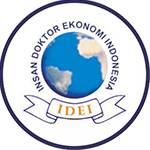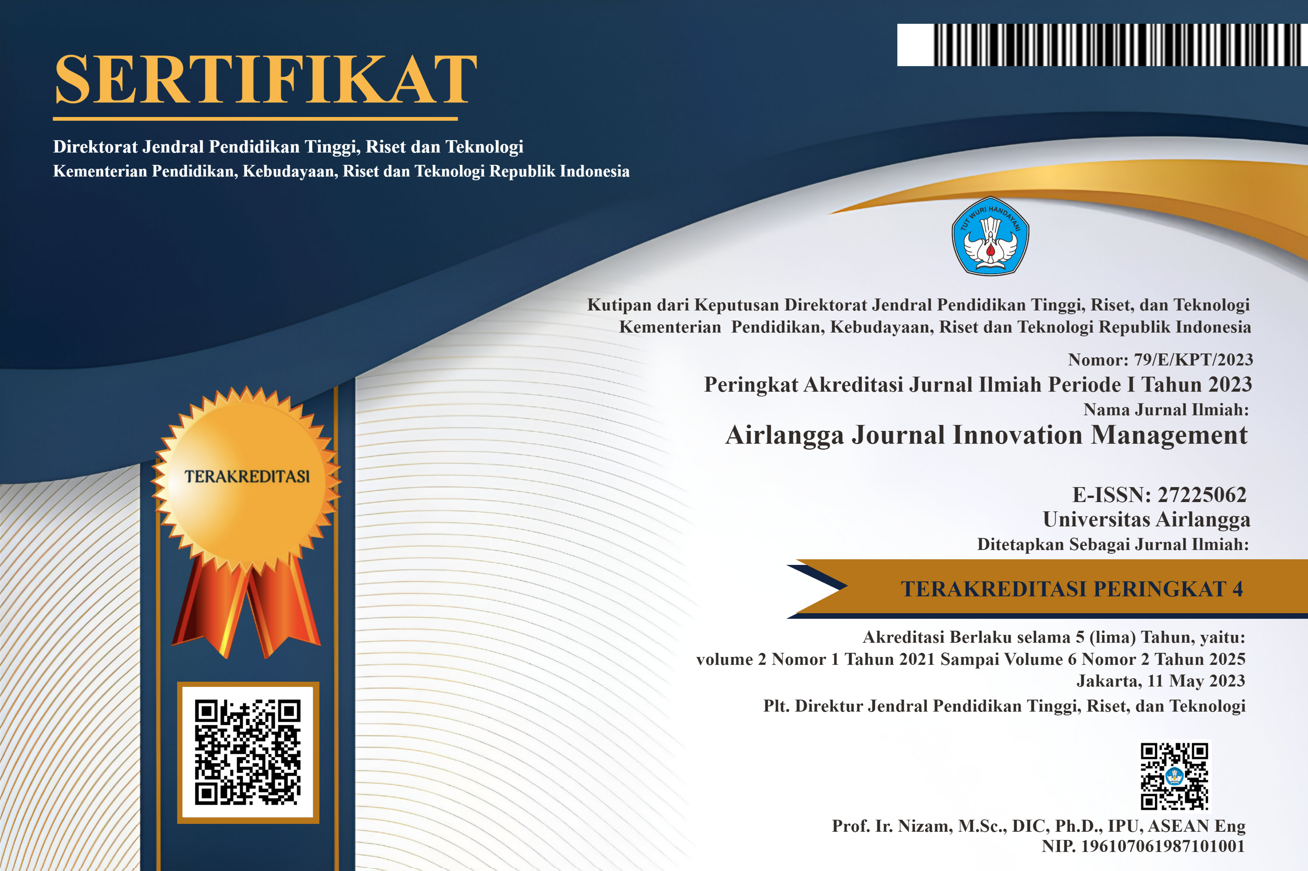Mapping Shariah Supervisory Board Literature for Islamic Finance Development
Downloads
This study aims to map the intellectual structure of research regarding the role of the Sharia Supervisory Board (SSB) in the development of Islamic finance. This mapping includes bibliographic analysis, keywords, and a network map of research trends. This study uses the bibliometric method by utilizing the Biblioshiny and Vos Viewer analysis tools. The researcher used 315 articles published on the Scopus page from 1988–2023. The results show that in the last 10 years, a topic about SSB has received great attention from researchers with an increase in article production. This topic has been discussed by authors from Indonesia, Malaysia, and Bangladesh. The results of the study also show that there are five clusters consisting of the role of SSB in the implementation of shariah governance; the role of SSB in encouraging the development of Islamic finance; SSB in improving the performance of Islamic banking; the characteristics of SSB; and the leadership and political system. The results of this study guide researchers, practitioners, and policymakers to understand the direction and focus of the Sharia Advisory Council (SSB) research. Its practical implications include strengthening the conceptual foundation of the SSB, supporting the development of the Islamic finance industry, and potentially becoming the basis for the development of a new conceptual framework in the future.
Abdul Latif, R., Taufil Mohd, K. N., Kamardin, H., & Mohd Ariff, A. H. (2023). Determinants of Sustainability Disclosure Quality among Plantation Companies in Malaysia. Sustainability (Switzerland), 15(4), 1–23. https://doi.org/10.3390/su15043799
Abozaid, A. (2022). Economic and Shariah Considerations in Debt Financing. Journal of King Abdulaziz University, Islamic Economics, 35(3). https://doi.org/10.4197/Islec.35-3.8
Agboklou, K. E., & Özkan, B. (2023). Determinants of the financial performance and sustainability of microfinance institutions in Togo. Sosyal Ekonomik Araştırmalar Dergisi, 23(1), 1–11. https://doi.org/10.30976/susead.1078784
Akbar, T., & Siti-Nabiha, A. K. (2022). Objectives and measures of performance of Islamic microfinance banks in Indonesia: the stakeholders’ perspectives. ISRA International Journal of Islamic Finance, 14(2), 124–140. https://doi.org/10.1108/IJIF-11-2020-0231
Alam, K., Rahman, S. A., Mustafa, H., Shah, S. M., & Hossain, S. (2019). Shariah governance framework of Islamic banks in Bangladesh: Practices, problems and recommendations. International Journal of English Language and Literature Studies, 9(1), 118–132. https://doi.org/10.18488/journal.aefr.2019.91.118.132
Alam, M. K., Rahman, M. M., Runy, M. K., Adedeji, B. S., & Hassan, M. F. (2022). The influences of Shariah governance mechanisms on Islamic banks performance and Shariah compliance quality. Asian Journal of Accounting Research, 7(1), 2–16. https://doi.org/10.1108/AJAR-11-2020-0112
Alam, M. K., Tabash, M. I., Thakur, O. A., Rahman, M. M., Siddiquii, M. N., & Hasan, S. (2023). Independence and effectiveness of Shariah department officers to ensure Shariah compliance: evidence from Islamic banks in Bangladesh. Asian Journal of Accounting Research, 8(1), 15–26. https://doi.org/10.1108/AJAR-01-2022-0022
Al-Aradi, A., & Albalooshi, S. (2023). Resilience of Islamic Banks in Bahrain: A Comparative Study of the 2007 Global Financial Crisis and the Covid-19 Pandemic. 2023 International Conference on Sustainable Islamic Business and Finance, SIBF 2023, 355–360. https://doi.org/10.1109/SIBF60067.2023.10380051
Al-Faryan, M. A. S., & Alokla, J. (2023). Do Publicly Listed Insurance Firms in Saudi Arabia Have Strong Corporate Governance? Economies, 11(1), 1–41. https://doi.org/10.3390/economies11010021
Aljughaiman, A., Salama, A., & Verousis, T. (2023). Corporate governance, Shari’ah governance and financial flexibility: Evidence from the MENA region. International Journal of Finance and Economics, April 2021, 1–20. https://doi.org/10.1002/ijfe.2878
Alshubiri, F., & Al Ani, M. K. (2023). Financing and returns of Shari’ah-compliant contracts and sustainable investing in the Islamic banking of Oman. In Economic Change and Restructuring (Vol. 56, Issue 4). Springer US. https://doi.org/10.1007/s10644-023-09522-8
Amina, H. (2015). Dividend policy and corporate governance in saudi stock market: Outcome model or substitute model? Corporate Ownership and Control, 12(2), 74–91. https://doi.org/10.22495/cocv12i2p7
Anwar, M. (2024). The Impact of Islamic Financial Deepening on Economic Growth in Indonesia. Airlangga Journal of Innovation Management, 5(1), 78–90. https://doi.org/10.20473/AJIM.V5I1.51402
Archer, C., & Idun, A. A. A. (2023a). Financial outreach, financial innovation, and sustainable development in Africa. Environmental Science and Pollution Research, 30(26), 69393–69415. https://doi.org/10.1007/S11356-023-27304-7/TABLES/5
Ashraf, M. A., & Lahsasna, A. (2017). Proposal for a new Sharīʿah risk rating approach for Islamic banks. ISRA International Journal of Islamic Finance, 9(1), 87–94. https://doi.org/10.1108/ijif-07-2017-008
Aspiranti, T., Ali, Q., Parveen, S., Amaliah, I., Jalil, M. A., & Merican, F. M. I. (2023). Bibliometric Review of Corporate Governance of Islamic Financial Institutions Through Ai-Based Tools. International Journal of Professional Business Review, 8(4), 1–30. https://doi.org/10.26668/businessreview/2023.v8i4.1710
Asunka, B. A., Glover-Akpey, I., & Azembila, A. B. (2016). The Effect of Audit Committees on the Performance of Firms Listed on the Ghana Stock Exchange. Article in IOSR Journal of Business and Management, 18(11), 55–62. https://doi.org/10.9790/487X-1811055562
Badshah, Y. A., Abdullah, Hashmi, M. A., & Shah, M. H. (2021a). Board oversight and financial performance of islamic banks in Arab and non-Arab countries. International Journal of Business and Society, 22(3), 1384–1401. https://doi.org/10.33736/IJBS.4310.2021
Bashir, M. S., & Babiker, A. A. (2023). Evaluation of Sharīʿah Governance Practices in Saudi Arabian Banks. Malaysian Journal of Syariah and Law, 11(2), 243–270. https://doi.org/10.33102/mjsl.vol11no2.480
Donthu, N., Kumar, S., Mukherjee, D., Pandey, N., & Lim, W. M. (2021). How to conduct a bibliometric analysis: An overview and guidelines. Journal of Business Research, 133, 285–296. https://doi.org/10.1016/J.JBUSRES.2021.04.070
Effendi, J., Qoyum, A., Wardhana, L. I., & Thaker, H. M. T. (2023). IT investment and Islamic banking performance in Indonesia: Do Sukuk issuance and Sariah governance matter? Banks and Bank Systems, 18(2), 75–87. https://doi.org/10.21511/bbs.18(2).2023.07
Ezzine, H. (2018). Corporate governance and social norms during financial crisis: evidence from France and Saudi Arabia. Journal of Management and Governance, 22(3), 707–748. https://doi.org/10.1007/s10997-017-9400-x
Fachrurrozie, Nurkhin, A., Wahyudin, A., Kholid, A. M., & Agustina, I. (2021). The effect of profitability, size and Shariah supervisory board of an Indonesian Islamic bank on the Islamic social reporting disclosure. Banks and Bank Systems, 16(3), 84–92. https://doi.org/10.21511/bbs.16(3).2021.08
Fadlur Rahman Bayuny, A., & Haron, R. (2023). Board structure, ownership structure, and capital structure: Empirical evidence on Shariah and non-Shariah compliant firms in Indonesia. Banks and Bank Systems, 18(4), 241–254. https://doi.org/10.21511/bbs.18(4).2023.20
Farag, H., Mallin, C., & Ow-Yong, K. (2018). Corporate governance in Islamic banks: New insights for dual board structure and agency relationships. Journal of International Financial Markets, Institutions and Money, 54, 59–77. https://doi.org/10.1016/j.intfin.2017.08.002
Farook, S., Kabir Hassan, M., & Lanis, R. (2011). Determinants of corporate social responsibility disclosure: the case of Islamic banks. Journal of Islamic Accounting and Business Research, 2(2), 114–141. https://doi.org/10.1108/17590811111170539
Haldar, A., Sucharita, S., Dash, D. P., Sethi, N., & Chandra Padhan, P. (2023). The effects of ICT, electricity consumption, innovation and renewable power generation on economic growth: An income level analysis for the emerging economies. Journal of Cleaner Production, 384(December 2022), 135607. https://doi.org/10.1016/j.jclepro.2022.135607
Hanif, M. (2018). Sharīʿah-compliance ratings of the Islamic financial services industry: a quantitative approach. ISRA International Journal of Islamic Finance, 10(2), 162–184. https://doi.org/10.1108/IJIF-10-2017-0038
Haridan, N. M., Hassan, A. F. S., & Karbhari, Y. (2018). Governance, religious assurance and Islamic banks: Do Shariah boards effectively serve? Journal of Management and Governance, 22(4), 1015–1043. https://doi.org/10.1007/s10997-018-9418-8
Hassan, A., Sohail, M. S., & Munshi, M. M. R. (2022). Sharīʿah governance and agency dynamics of Islamic banking operations in the Kingdom of Saudi Arabia. ISRA International Journal of Islamic Finance, 14(1), 89–106. https://doi.org/10.1108/IJIF-12-2020-0252
Htay, S. N. N., & Salman, S. A. (2013). Balanced score card approach for better Shari’Ah corporate governance. American Journal of Applied Sciences, 10(12), 1553–1557. https://doi.org/10.3844/ajassp.2013.1553.1557
Ibrahim, M. A., Mat Nor, A., & Raja Hisham, R. R. I. (2021). Factors influencing Bumiputera contractors’ acceptance of the contractor’s all risk takāful product. ISRA International Journal of Islamic Finance, 13(3), 364–377. https://doi.org/10.1108/IJIF-09-2020-0188
Isa, M., Lee, S. P., Bacha, O. I., & Ahmad, R. (2022). Some thoughts on resetting the roles and functions of Sharīʿah committees of Islamic banks in Malaysia. ISRA International Journal of Islamic Finance, 14(2), 175–189. https://doi.org/10.1108/IJIF-05-2021-0096
Islamic, I., & Box, P. O. (2022). SHARĪʿAH RISK MANAGEMENT PRACTICES IN MALAYSIAN ISLĀMIC BANKS Noraini Mohd Ariffin Department of Accounting , Kulliyyah of Economics and Management The Islāmic Financial Services Board ( 2005 ) stated that Sharīʿah non- compliance risk arises from Islāmic. 1(1), 101–123.
Ismail, A. M., Ismail, C. R., Sulaiman, S., & Daud, D. (2020a). Corporate Governance and Firm Risk: Evidence from Malaysian Shariah Compliance Companies. Humanities and Social Sciences Letters, 8(2), 169–193. https://doi.org/10.18488/JOURNAL.73.2020.82.169.193
Jamaludin, M. F., & Bahaudin, M. F. (2022). Board Characteristics and Company Performance: A Study of Shariah-Compliant Public Listed Companies in Malaysia. Global Business and Management Research: An International Journal Vol., 14(3s), 1559–1585.
Mallin, C., Farag, H., & Ow-Yong, K. (2014). Corporate social responsibility and financial performance in Islamic banks. Journal of Economic Behavior and Organization, 103(March 2013), S21–S38. https://doi.org/10.1016/j.jebo.2014.03.001
Migdad, A. M. (2017). CSR practices of Palestinian Islamic banks: contribution to socio-economic development. ISRA International Journal of Islamic Finance, 9(2), 133–147. https://doi.org/10.1108/ijif-06-2017-0001
Mollah, S., & Zaman, M. (2015). Shari’ah supervision, corporate governance and performance: Conventional vs. Islamic banks. Journal of Banking and Finance, 58, 418–435. https://doi.org/10.1016/j.jbankfin.2015.04.030
Mukhibad, H., Jayanto, P. Y., Jati, K. W., & Khafid, M. (2022). Attributes of Shariah Supervisory Board and shariah compliance. Corporate Governance and Organizational Behavior Review, 6(3), 173. https://doi.org/10.22495/CGOBRV6I3P16
Mukhibad, H., Nurkhin, A., Anisykurlillah, I., Fachrurrozie, F., & Jayanto, P. Y. (2023). Open innovation in shariah compliance in Islamic banks – Does shariah supervisory board attributes matter? Journal of Open Innovation: Technology, Market, and Complexity, 9(1), 100014. https://doi.org/10.1016/j.joitmc.2023.100014
Musleh Alsartawi, A. (2019). Performance of Islamic banks Do the frequency of Sharīʿah supervisory board meetings and independence matter? ISRA International Journal of Islamic Finance, 11(2), 303–321. https://doi.org/10.1108/ijif-05-2018-0054
Nawaz, T. (2019). Exploring the Nexus Between Human Capital, Corporate Governance and Performance: Evidence from Islamic Banks. Journal of Business Ethics, 157(2), 567–587. https://doi.org/10.1007/s10551-017-3694-0
Naz, S. A., & Gulzar, S. (2023). Islamic financial development & economic growth: the emergence of Islamic financial market in Pakistan. Journal of Islamic Accounting and Business Research, 14(6), 989–1012. https://doi.org/10.1108/JIABR-09-2022-0222
Nomran, N. M., Haron, R., & Hassan, R. (2018). Shari’ah supervisory board characteristics effects on Islamic banks’ performance: Evidence from Malaysia. International Journal of Bank Marketing, 36(2), 290–304. https://doi.org/10.1108/IJBM-12-2016-0197
Nour Aldeen, K., Ratih, I. S., & Sari Pertiwi, R. (2022). Cash waqf from the millennials’ perspective: a case of Indonesia. ISRA International Journal of Islamic Finance, 14(1), 20–37. https://doi.org/10.1108/IJIF-10-2020-0223/FULL/PDF
Pahlevi, R. W. (2023). Mapping of Islamic corporate governance research: a bibliometric analysis. Journal of Islamic Accounting and Business Research, 14(4), 538–553. https://doi.org/https://doi.org/10.1108/JIABR-12-2021-0314
Pratama, B. C., Kamaluddin, A., & Saad, S. (2022). Social Performance of Islamic Banks in South-East Asia: Is Intellectual Capital and Sharia Supervisory Boards Matters? Quality - Access to Success, 23(186), 141–150. https://doi.org/10.47750/QAS/23.186.18
Rahman Bayuny, A. F., & Haron, R. (2023). Board structure, ownership structure, and capital structure: Empirical evidence on Shariah and non-Shariah compliant firms in Indonesia. Banks and Bank Systems, 18(4), 241–254. https://doi.org/10.21511/BBS.18(4).2023.20
Refinitiv. (2022). Refinitiv Islamic Finance Development Report 2022. LSEG Business, 80.
Ridha, M., & Umiyati, U. (2022). Sharia Compliance, Islamic Corporate Governance dan Non Performing Financing Terhadap Pengungkapan Fraud Bank Umum Syariah. Jurnal Akuntansi Dan Governance, 3(1), 1. https://doi.org/10.24853/jago.3.1.1-16
Sabiu, T. T., & Abduh, M. (2020). Islamic Financial Development and Economic Growth in Nigeria: a Bounds Testing Approach. Journal of Islamic Monetary Economics and Finance, 6(3), 597–620. https://doi.org/10.21098/jimf.v6i3.1191
Safiullah, M. (2023a). Funding liquidity in Islamic banks: Does the Shariah supervisory board’s higher educational attainment matter? Pacific-Basin Finance Journal, 78, 101976. https://doi.org/10.1016/J.PACFIN.2023.101976
Saleem, A., Sági, J., & Setiawan, B. (2021). Islamic financial depth, financial intermediation, and sustainable economic growth: ARDL approach. Economies, 9(2), 1–22. https://doi.org/10.3390/economies9020049
Sheikh, R., Ayaz, M., & Siddique, M. A. (2023). Sharī‘ah Governance and Sharī‘ah Non-Compliance Risk Management: A Maqāsid Sharī‘ah Based Appraisal. Journal of Islamic Thought and Civilization, 13(1), 270–291. https://doi.org/10.32350/jitc.131.19
Shittu, A. D., Ismail, S. F., & Ndaman, M. N. (2022). Shariah and Social Reconstructions in Northern Nigeria: Evidence From Niger State Zakat and Endowment Board (2001-2017). Malaysian Journal of Syariah and Law, 10(2), 16–25. https://doi.org/10.33102/mjsl.vol10no2.347
Sidaoui, M., Ben Bouheni, F., Arslankhuyag, Z., & Mian, S. (2022). Fintech and Islamic banking growth: new evidence. Journal of Risk Finance, 23(5), 535–557. https://doi.org/10.1108/JRF-03-2022-0049
So, I. G., Haron, H., Gui, A., Princes, E., & Sari, S. A. (2023). Human Governance Development Index of Shariah Compliant Companies in Malaysia and Indonesia. WSEAS Transactions on Business and Economics, 20, 611–618. https://doi.org/10.37394/23207.2023.20.56
Souryal, S. (1988). The Role of Shariah Law in Deterring Criminality in Saudi-Arabia. International Journal of Comparative and Applied Criminal Justice, 12(1–2), 1–25. https://doi.org/10.1080/01924036.1988.9688875
Sueb, M., Prasojo, Muhfiatun, Syarifah, L., & Putra, R. N. A. (2022a). The effect of shariah board characteristics, risk-taking, and maqasid shariah on an Islamic bank’s performance. Banks and Bank Systems, 17(3), 89–101. https://doi.org/10.21511/bbs.17(3).2022.08
Suhendar, Zulfikar, R., Bastian, E., & Hanifah, I. A. (2023). Trend of the Research on Islamic Corporate Governance in Islamic Banking: A Bibliometric Analysis. Journal of Law and Sustainable Development, 11(9), e1468. https://doi.org/10.55908/sdgs.v11i9.1468
Sulistiani, D., & Tjahjadi, B. (2022). Does Financial Performance Mediate the Effect of Good Corporate Governance on Indonesian Ṣukūk Rating? Journal of King Abdulaziz University, Islamic Economics, 35(2), 97–114. https://doi.org/10.4197/Islec.35-2.6
Supriatna, A., Umiyati, & Kamal, M. (2022). The Influence of Sharia Compliance and Islamic Corporate Governance on Fraud. ITQAN: Journal of Islamic Economics, Management, and Finance, 1(2), 68–80. https://doi.org/10.57053/itqan.v1i2.12
Syaifullah, Heriangrum, S., Damirah, Lestari, N. P., & Hudaifah, A. (2024). Factors Influencing Economic Growth in OIC Countries: A Panel Data Approach. Airlangga Journal of Innovation Management, 5(2), 291–305. https://doi.org/10.20473/AJIM.V5I2.57640
Syarofi, M., & Putri, L. (2023). The Importance of Sharia Supervisory Board on Islamic Financial Institution. Airlangga Journal of Innovation Management, 4(1), 74–83. https://doi.org/10.20473/AJIM.V4I1.45357
Tashkandi, A. A. (2019). The impact of governance mechanisms on profitability of Islamic banks in the GCC countries during 2005-2016. Journal of King Abdulaziz University, Islamic Economics, 32(3), 163–190. https://doi.org/10.4197/Islec.32-3.10
Triyanto, D. (2022). Sharia Compliance, Islamic Corporate Governance, and Fraud: A study of Sharia Banks in Indonesia. Journal of Intelligence Studies in Business, 12(1), 34–43. https://doi.org/10.37380/JISIB.V12I1.925
Tuyon, J., Onyia, O. P., Ahmi, A., & Huang, C. H. (2023). Sustainable financial services: reflection and future perspectives. Journal of Financial Services Marketing, 28(4), 664–690. https://doi.org/10.1057/s41264-022-00187-4
Yusgiantoro, I., Pamungkas, P., & Trinugroho, I. (2023). The sustainability and performance of Bank Wakaf Mikro: waqf-based microfinance in Indonesia. International Journal of Islamic and Middle Eastern Finance and Management, 86–101. https://doi.org/10.1108/IMEFM-06-2022-0233
Zaki, A., Sholihin, M., & Barokah, Z. (2014). The association of Islamic bank ethical identity and financial performance: evidence from Asia. Asian Journal of Business Ethics, 3(2), 97–110. https://doi.org/10.1007/s13520-014-0034-7
Copyright (c) 2024 Airlangga Journal of Innovation Management

This work is licensed under a Creative Commons Attribution-NonCommercial-ShareAlike 4.0 International License.
- The journal allows authors to hold copyright without restrictions and retain publication rights without restrictions. The author retains the copyright and grants the first publication rights to the journal, with his work simultaneously licensed under the Creative Commons Attribution-NonCommercial-ShareAlike 4.0 International License (CC BY-NC-SA). This license allows others to share the work with acknowledgment of authorship and initial publication in this journal, provided that the work is not used for commercial purposes and that any derivative works must use the same license.
- Authors may enter into additional contractual agreements for non-exclusive distribution of the journal publication version (e.g., uploading it to an institutional repository or publishing it in book form), while still including acknowledgment of the initial publication in this journal.
- Authors are allowed and encouraged to upload their work online (e.g., in an institutional repository or personal website) before and during the submission process. This can support productive scientific exchanges as well as increase citations to published works.

AJIM by UNAIR is licensed under a Creative Commons Attribution-NonCommercial-ShareAlike 4.0 International License.





















